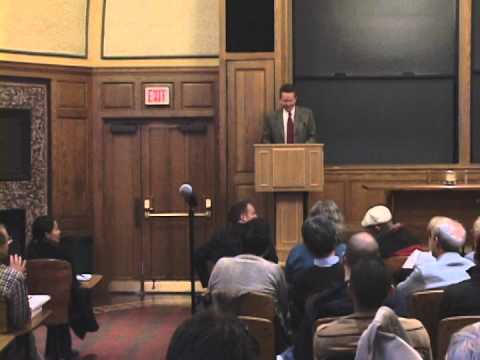[Video description from YouTube] In exploring the relationship between religion and science, some have argued that among the world’s religions, Buddhism is the most compatible with science. Over the course of his lectures, Professor Lopez examines the origins of the association of the Buddha with modern science, considers what is at stake in that association and suggests new directions for the role of the Buddha in scientific research.
LI’ve always enjoyed that lecture series, and appreciate Professor Lopez’s skeptical take on attempts to yoke traditional Buddhist doctrine and philosophy to modern science.
But it seems to me Professor Lopez is very content to use commentarial traditions, popular stories and Sanskrit philosophy that in some cases dates from many hundreds of years after the Buddha to characterize what “Buddhism” says about karma, the mind and related matters. There is nothing wrong with that, but one may then legitimately ask questions about just how much of “Buddhism” the historical Buddha actually taught.
For example, in the third video, he says describes an account of karmic fruition based on the transmigration of “consciousness” into the gestating human embryo. But this account is explicitly rejected in the Majjhima nikaya, where the Buddha upbraids a wanderer who has come to believe a similar theory.
In the nikayas, the usual picture is that consciousness is itself a conditioned phenomenon, occurring when the organs of sensation make “contact” - in a manner that is never fully explained or described - with “form” that apparently has an independent external existence. Clearly these events of sensory consciousness are thought to be bilaterally conditioned by two entities or phenomena that are both in some sense physical. So when Lopez says later that Buddhists were always strict mind-body dualists, that doesn’t seem completely warranted. There is the further phenomenon of the sixth kind of consciousness - mind consciousness of mind objects - but even this phenomenon is clearly conditioned by two other depenently originated factors, and there doesn’t appear to be any suggestion in the suttas that this kind of consciousness, which is an event, not a thing, ever transmigrates into an embryo.
I agree! His lectures are fantastic, but like you mentioned, some of his interpretations are not supported by the EBTs. Overall an engaging lecture series.
Yes, there’s no viññana transmigration but at least in MN38 we have the reference to the requirement of the presence of a gandhabba for the union of a father and mother to yield a baby.
“Bhikkhus, the descent of the embryo takes place through the union of three things.
Here, there is the union of the mother and father, but the mother is not in season, and the gandhabba is not present—in this case no descent of an embryo takes place.
Here, there is the union of the mother and father, and the mother is in season, but the gandhabba is not present—in this case too no descent of the embryo takes place.
But when there is the union of the mother and father, and the mother is in season, and the gandhabba is present, through the union of these three things the descent of the embryo takes place.
The mother then carries the embryo in her womb for nine or ten months (…)”
My understanding is that Donald Lopez pushes back on the very idea of a “historical Buddha” or “early Buddhist texts”. He seems to think it basically a kind of Victorian conceit along with the claim that Buddhist religion is particularly rational. (FWIW, my review of his book is here: Donald Lopez on Buddhism and Science).
Ancient cultures had all sorts of wacky ideas about conception & pregnancy (a woman giving birth in ancient Greece was consciously put in a room with no knots, for example, because that could allegedly complicate the birth process). They needed a way to explain why sometimes sex didn’t result in children, or why sometimes there were stillborn children or twins or whatever it might be, and they came up with all manner of silliness. Many folk still have silly ideas about this topic.
I wonder what Lopez might say about this sort of thing.
Are gandhabbas something similar to cupids? 



